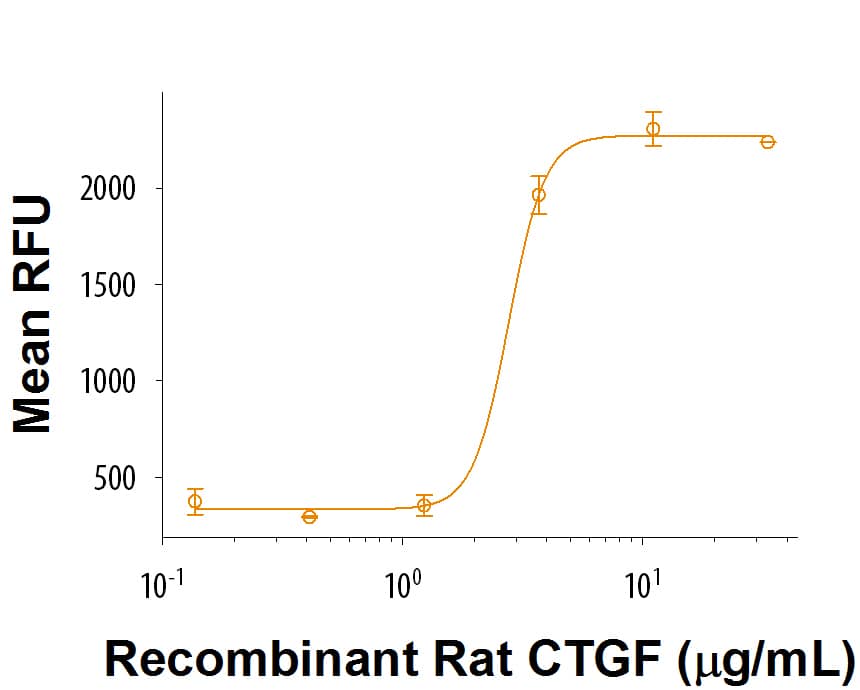Recombinant Rat CTGF Protein, CF
R&D Systems, part of Bio-Techne | Catalog # 9237-CT

Key Product Details
Product Specifications
Source
Human embryonic kidney cell, HEK293-derived rat CTGF/CCN2 protein
Gln25-Ala347
Gln25-Ala347
Purity
>85%, by SDS-PAGE visualized with Silver Staining and quantitative densitometry by Coomassie® Blue Staining.
Endotoxin Level
<0.10 EU per 1 μg of the protein by the LAL method.
N-terminal Sequence Analysis
No results obtained. Gln25 inferred from enzymatic pyroglutamate treatment revealing Asp26
Predicted Molecular Mass
35 kDa
SDS-PAGE
35-41 kDa, reducing conditions
Activity
Measured by its ability to mediate Balb/3T3 mouse embryonic fibroblast cell adhesion. Ball, D.K. et al. (2003) Reproduction 125:271.
The ED50 for this effect is 1-5 μg/mL
The ED50 for this effect is 1-5 μg/mL
Scientific Data Images for Recombinant Rat CTGF Protein, CF
Recombinant Rat CTGF Protein Bioactivity
Immobilized Recombinant Rat CTGF (Catalog # 9237-CT) supports the adhesion of Balb/3T3 mouse embryonic fibroblast cells. The ED50 for this effect is 1-5 μg/mLFormulation, Preparation and Storage
9237-CT
| Formulation | Lyophilized from a 0.2 μm filtered solution in PBS and NaCl. |
| Reconstitution |
Reconstitute at 500 μg/mL in water.
|
| Shipping | The product is shipped at ambient temperature. Upon receipt, store it immediately at the temperature recommended below. |
| Stability & Storage | Use a manual defrost freezer and avoid repeated freeze-thaw cycles.
|
Background: CTGF/CCN2
References
- Hall-Glenn, F. and K.M. Lyons (2011) Cell. Mol. Life Sci. 68:3209.
- Xu, J. et al. (2000) J. Cell. Biochem. 77:103.
- Gao, R. and D.R. Brigstock (2004) J. Biol. Chem. 279:8848.
- Schober, J.M. et al. (2002) Blood 99:4457.
- Heng, E.C.K. et al. (2006) J. Cell Biochem. 98:409.
- Jedsadayanmata, A. et al. (1999) J. Biol. Chem. 274:24321.
- Gao, R. et al. (2003) Hepatol. Res. 27:214.
- Mercurio, S. et al. (2004) Development 131:2137.
- Wahab, N.A. et al. (2005) J. Am. Soc. Nephrol. 16:340.
- Abreu, J.G. et al. (2002) Nat. Cell Biol. 4:599.
- Hashimoto, G. et al. (2002) J. Biol. Chem. 277:36288.
- Khodosevich, K. et al. (2013) Neuron 79:1136.
- Shi-Wen, X. et al. (2006) J. Biol. Chem. 281:10715.
- Lee, C.H. et al. (2010) J. Clin. Invest. 120:3340.
- Canalis, E. et al. (2010) Endocrinology 151:3490.
- Nakanishi, T. et al. (2000) Endocrinology 141:264.
- Ivkovic, S. et al. (2003) Development 130:2779.
- Hall-Glenn, F. et al. (2012) PLoS One 7:e30562.
- Shimo, T. et al. (1999) J. Biochem. 126:137.
Long Name
Connective Tissue Growth Factor
Alternate Names
CCN2, CTGRP, Fisp12, HCS24, IGFBP-8, NOV2
Gene Symbol
CCN2
UniProt
Additional CTGF/CCN2 Products
Product Documents for Recombinant Rat CTGF Protein, CF
Product Specific Notices for Recombinant Rat CTGF Protein, CF
For research use only
